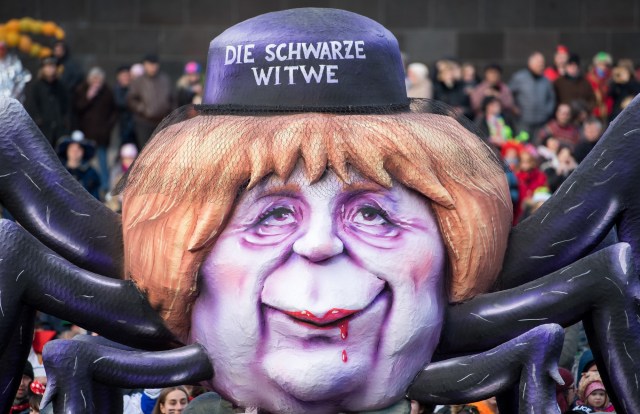Angela Merkel as The Black Widow on a float in Germany. Photo by Lukas Schulze/Getty Images,)

What does Angela Merkel talk about when meeting with her fellow Christian Democrats or on a visit to Washington?
According to Rene Pfister (in a must-read piece for Spiegel Online) a favourite subject is something that came to an end exactly 400 years ago – the Peace of Augsburg, which was signed in 1555.
“The treaty initiated a 60-year phase of peace between Protestants and Catholics after the bloody turmoil of the Reformation and it initially seemed as though people had finally come to their senses. But that image turned out to be a deceptive one. In 1618, a war began unlike any the Continent had ever seen before. By the time the inferno ended 30 years later, large parts of Germany had been depopulated and many cities left in ruins.”
The war that started in 1618 was the Thirty Years’ War – arguably the most devastating conflict in central Europe until the First World War.
But why would Merkel be so interested in it now?
“To Merkel, the Peace of Augsburg is much more than some distant historical date. Rather, it is a warning of just how thin the varnish covering civilization really is. Just as people in the late 16th century were erroneous in their belief that the Peace of Augsburg would be enduring, we could be just as mistaken today in the belief that the postwar order, with all its treaties and alliances, serves as a guarantee that the scourge of war will not return.”
The Holy Roman Empire of the 16th and 17th centuries is, in many ways, analogous to the Europe Union today. Indeed, the parallels may be rather too close for Merkel’s comfort.
Famously, the HRE was neither holy, nor Roman, nor an empire. Rather it was a patchwork of loosely confederated states centred on, but not limited to, modern-day Germany and Austria.
The states varied in size and power from territories not much bigger than a single town (or in, one case, a monastery) to Habsburg Austria at the other end of the scale. After the Reformation, they also varied in religious allegiance. The Peace of Augsburg was a compromise between the Catholic princes (above all the Habsburg emperor) and their Lutheran Protestant counterparts. The key principle of the Peace was Cuius regio, eius religio – ‘Whose realm, his religion’. In other words, the people of each state would be expected to follow the denominational preference of the ruler (freedom of religion not being for the peasants).
If one reverses the positions of north and south, Protestant and Catholic, the parallel between the HRE and the EU emerges.
The EU too is a patchwork of states – from the very small (such as Luxembourg, a remnant of the HRE) all the way up to the dominant power, Germany. And there’s also an ideological fault-line that runs between them – dividing the economically orthodox core of the Eurozone from the heterodox countries of the periphery. The EU can be seen as a compromise between these two halves (albeit one that leaves no doubt as where the imperial authority resides).
There were many reasons why the Peace of Augsburg broke down. One of them was that the compromise only covered Catholics and Lutherans. The established powers were, therefore, destabilised by the emergence of Calvinism as a disruptive third force – and driven to murderous fury by the even more radical Anabaptists.
In today’s EU, the third force is represented by countries such as Poland and Hungary – whose defiance of the liberal true faith is a constant source of vexation. And let’s not even mention the ultimate heresy of Brexit.
If the Thirty Years’ War can he blamed on one man, it is the Habsburg emperor Ferdinand II, whose disdain for compromise with the Lutherans – let alone the more challenging heretics – turned conflict into all-out-war.
His solution to the tensions of the Empire was to impose the will of the strongest power – and its ideology – on the other states.
I wonder if Angela Merkel can think of anything like that in the EU today?










Join the discussion
Join like minded readers that support our journalism by becoming a paid subscriber
To join the discussion in the comments, become a paid subscriber.
Join like minded readers that support our journalism, read unlimited articles and enjoy other subscriber-only benefits.
Subscribe